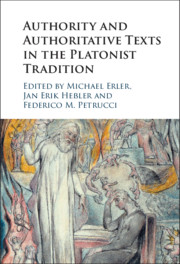Book contents
- Authority and Authoritative Texts in the Platonist Tradition
- Authority and Authoritative Texts in the Platonist Tradition
- Copyright page
- Contents
- Figures
- Contributors
- Acknowledgements
- Abbreviations
- Introduction
- Chapter 1 Xenocrates’ Invention of Platonism
- Chapter 2 An Iconography of Xenocrates’ Platonism
- Chapter 3 Arcesilaus’ Appeal to Heraclitus as a Philosophical Authority for His Sceptical Stance
- Chapter 4 Authority beyond Doctrines in the First Century bc
- Chapter 5 Authority and Doctrine in the Pseudo-Pythagorean Writings
- Chapter 6 Constructing Authority
- Chapter 7 Plutarch’s E at Delphi
- Chapter 8 Aristotle’s Physics as an Authoritative Work in Early Neoplatonism
- Chapter 9 Conflicting Authorities? Hermias and Simplicius on the Self-Moving Soul
- Chapter 10 Kathēgemōn: The Importance of the Personal Teacher in Proclus and Later Neoplatonism
- Chapter 11 ‘In Plato we can see the bad characters being changed by the good and instructed and purified.’
- References
- Index Locorum1
- General Index
Chapter 11 - ‘In Plato we can see the bad characters being changed by the good and instructed and purified.’
Attitudes to Platonic Dialogue in Later Neoplatonism*
Published online by Cambridge University Press: 19 February 2021
- Authority and Authoritative Texts in the Platonist Tradition
- Authority and Authoritative Texts in the Platonist Tradition
- Copyright page
- Contents
- Figures
- Contributors
- Acknowledgements
- Abbreviations
- Introduction
- Chapter 1 Xenocrates’ Invention of Platonism
- Chapter 2 An Iconography of Xenocrates’ Platonism
- Chapter 3 Arcesilaus’ Appeal to Heraclitus as a Philosophical Authority for His Sceptical Stance
- Chapter 4 Authority beyond Doctrines in the First Century bc
- Chapter 5 Authority and Doctrine in the Pseudo-Pythagorean Writings
- Chapter 6 Constructing Authority
- Chapter 7 Plutarch’s E at Delphi
- Chapter 8 Aristotle’s Physics as an Authoritative Work in Early Neoplatonism
- Chapter 9 Conflicting Authorities? Hermias and Simplicius on the Self-Moving Soul
- Chapter 10 Kathēgemōn: The Importance of the Personal Teacher in Proclus and Later Neoplatonism
- Chapter 11 ‘In Plato we can see the bad characters being changed by the good and instructed and purified.’
- References
- Index Locorum1
- General Index
Summary
As we shall see in the course of this chapter, a similar approach to Plato’s use of characters in his dialogues can be found in Proclus, Olympiodorus and elsewhere.4 Twenty-first century readers of Plato, conscious of the need to appreciate Plato’s dialogues as works of literature as well as philosophy, may well be struck by remarks like these,5 and may wonder how the Neoplatonists of late antiquity reconciled their awareness of Plato’s skill in characterization with treating Plato as a philosophical authority. That will be my topic in this chapter. I begin with a brief discussion of some modern interpreters who emphasize Plato’s use of dialogue form, from which we shall see that even in our postmodern age such an emphasis can still be combined with a belief that Plato is a dogmatic philosopher. I will then turn to fuller examination of the interpretation of Plato’s characters by Proclus and Olympiodorus, including how this relates to their acceptance of Plato’s authority.
- Type
- Chapter
- Information
- Authority and Authoritative Texts in the Platonist Tradition , pp. 227 - 244Publisher: Cambridge University PressPrint publication year: 2021
- 2
- Cited by

